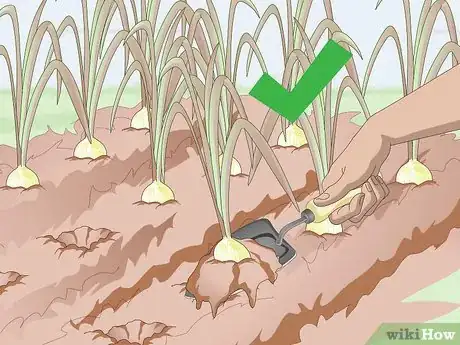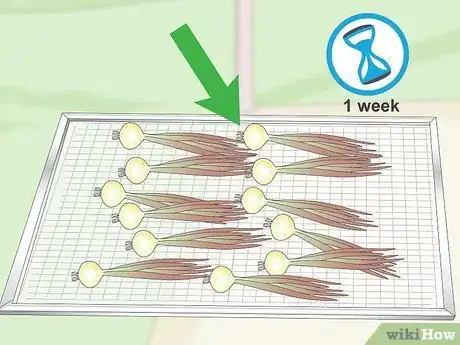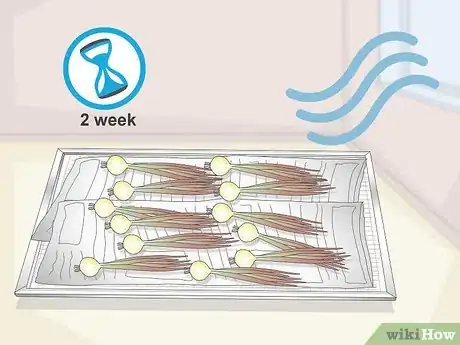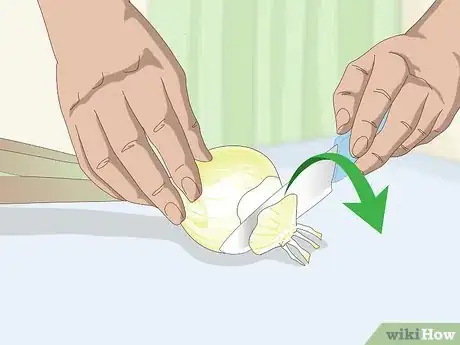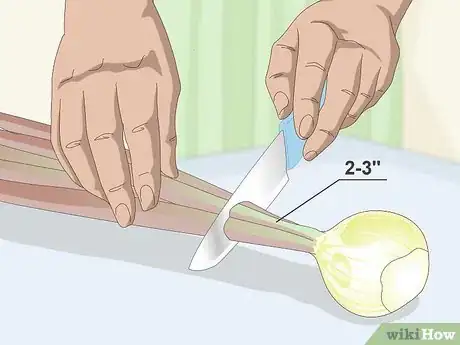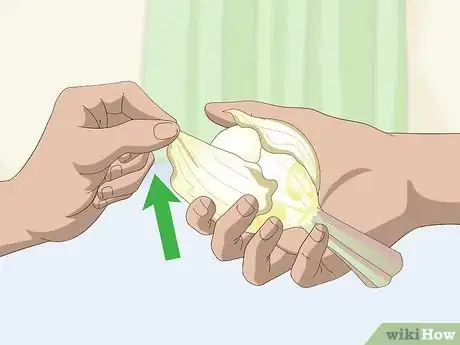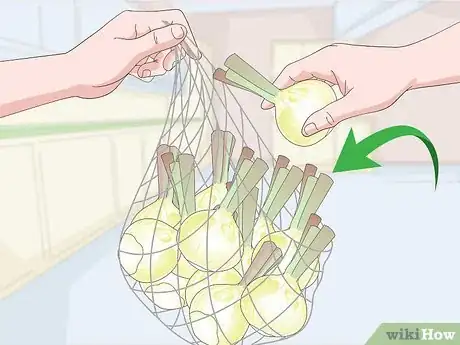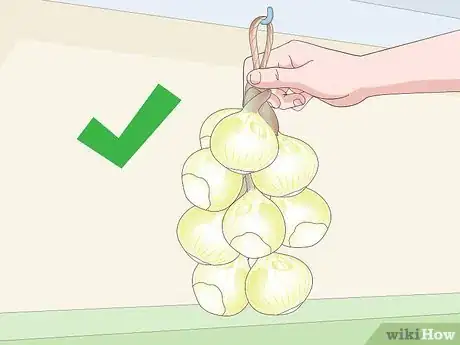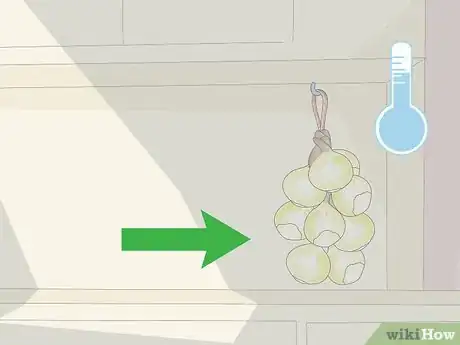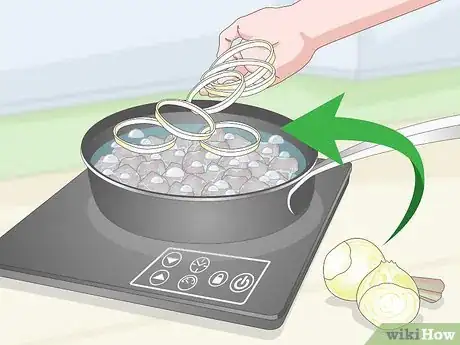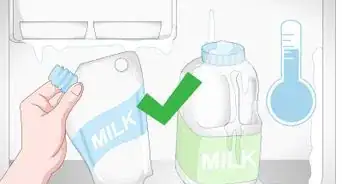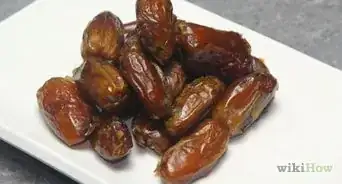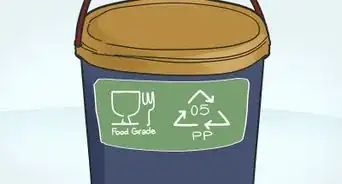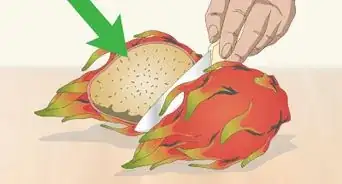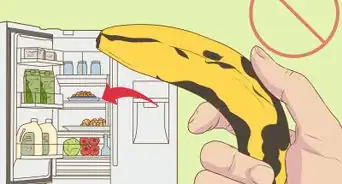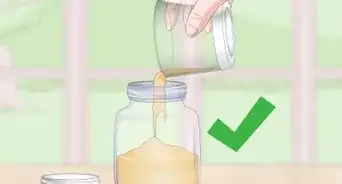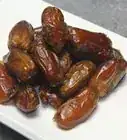This article was co-authored by Olivia Choong and by wikiHow staff writer, Kyle Hall. Olivia Choong is a Plant and Gardening Specialist and the Owner of The Tender Gardener. With more than six years of experience, she specializes in gardening, permaculture, and self-sufficient and low-impact living practices. Her work has been featured in media outlets such as The Straits Times and Channel NewsAsia (CNA). Olivia holds a Bachelor of Mass Communications in PR and Journalism from Murdoch University.
This article has been viewed 38,276 times.
Onions fresh from the garden make a great addition to a variety of meals. Luckily, you don’t need to use up all your onions right after you harvest them. By properly storing your onions, you can keep them fresh for several months.
Steps
Harvesting and Curing Your Onions
-
1Harvest your onions when the leaves droop and turn brown. Waiting until the leaves are like this will ensure your onions are the right size for storage. To harvest your onions, dig the bulbs out of the ground using a shovel or large fork.[1]
-
2Let your onions dry outside for 1 week.[2] You can lay the onions on the soil you dug them out from, or put them on a wire rack. Spread the onions out so they’re not touching each other. If there’s rainy weather, dry the onions out in a covered space like a shed, greenhouse, or garage.[3]Advertisement
-
3Cure your onions in a covered space for 2 weeks. Curing is the process of fully drying out the outer skins of the onions. Place your onions on a wire rack or layer of newspaper so none of the onions are touching. Choose a covered space that gets air circulation so the onions don’t get moist and develop mold.[4] [5]
Cutting Your Onions
-
1Cut the roots off your onions. Lay your onions on a flat surface and use a knife or sharp scissors to snip off the roots at the bottom of each onion. Dispose of the roots after you cut them off.[6]
-
2Cut the stems off 2–3 inches (5.1–7.6 cm) from the bulbs of your onions. The stems are the thin long parts at the tops of the onions. Use a knife or sharp scissors to cut off the stems.[7]
-
3Peel away any loose skin on your onions. After drying and curing your onions, the outer layers of skin should be dry and starting to peel off. Use your hands to pull away the outer layers of skin.[8]
Storing Your Onions
-
1Store your onions in a net bag if you want to keep them out of sight. Use a net bag designed specifically to hold fruits and vegetables. Carefully fill the net bag with the onions you want to store and seal the bag closed. If you’re storing a lot of onions, you may need to use more than 1 bag. Once all your onions are bagged, find a place to hang the bag so it’s off the ground.[9]
-
2Store your onions on a string for easy access. Cut a 3–4 feet (0.91–1.22 m) piece of string and tie the ends together so you have a loop. Hang the string loop on a hook. Then, one at a time, attach your onions to the string by wrapping the stems around the string so the onions hang from the loop. As you hang each onion, push it toward the bottom of the loop so it’s up against the onion before it. When you're finished, all your onions should hang in a nice bundle on the string.[10]
-
3Hang up your onions in a cool, dry, dark place. These conditions will help keep your onions fresh for longer. A garage, cellar, or unheated room are all good places to store your onions.[11]
- If you can, try to find a spot to store your onions where the temperature is 32–35 °F (0–2 °C). If you don't have a spot that cool, try to find the coolest place in your home to store them.[12]
-
4Use your onions within several months after storing. The exact amount of time your onions will stay fresh depends on the kind of onion they are and what your storage conditions are, but they may last in storage for several months. Check on your onions weekly and use any that are starting to develop soft spots so they don't go bad.[13]
Expert Q&A
-
QuestionCan you can raw onions?
 Olivia ChoongOlivia Choong is a Plant and Gardening Specialist and the Owner of The Tender Gardener. With more than six years of experience, she specializes in gardening, permaculture, and self-sufficient and low-impact living practices. Her work has been featured in media outlets such as The Straits Times and Channel NewsAsia (CNA). Olivia holds a Bachelor of Mass Communications in PR and Journalism from Murdoch University.
Olivia ChoongOlivia Choong is a Plant and Gardening Specialist and the Owner of The Tender Gardener. With more than six years of experience, she specializes in gardening, permaculture, and self-sufficient and low-impact living practices. Her work has been featured in media outlets such as The Straits Times and Channel NewsAsia (CNA). Olivia holds a Bachelor of Mass Communications in PR and Journalism from Murdoch University.
Plant & Gardening Specialist Yes, but only if you use pressure canning. Pressure canning helps kill microorganisms and prevents botulism bacteria from forming. Start by chopping up the onions and boiling them for about 5 minutes. Then, place them in heated, pint-sized (473.1 mL) jars and add 0.5 tsp (3 g) of salt to each container. Pour boiling water into each jar, leaving 1 in (2.54 cm) of headspace on top. Finally, remove all air bubbles before sealing the jars shut.
Yes, but only if you use pressure canning. Pressure canning helps kill microorganisms and prevents botulism bacteria from forming. Start by chopping up the onions and boiling them for about 5 minutes. Then, place them in heated, pint-sized (473.1 mL) jars and add 0.5 tsp (3 g) of salt to each container. Pour boiling water into each jar, leaving 1 in (2.54 cm) of headspace on top. Finally, remove all air bubbles before sealing the jars shut. -
QuestionHow do you dehydrate onions at home?
 Olivia ChoongOlivia Choong is a Plant and Gardening Specialist and the Owner of The Tender Gardener. With more than six years of experience, she specializes in gardening, permaculture, and self-sufficient and low-impact living practices. Her work has been featured in media outlets such as The Straits Times and Channel NewsAsia (CNA). Olivia holds a Bachelor of Mass Communications in PR and Journalism from Murdoch University.
Olivia ChoongOlivia Choong is a Plant and Gardening Specialist and the Owner of The Tender Gardener. With more than six years of experience, she specializes in gardening, permaculture, and self-sufficient and low-impact living practices. Her work has been featured in media outlets such as The Straits Times and Channel NewsAsia (CNA). Olivia holds a Bachelor of Mass Communications in PR and Journalism from Murdoch University.
Plant & Gardening Specialist Remove the skins and slice the onions thinly. Then, place them in the dehydrator. The onion slices should feel brittle once they're completely dehydrated.
Remove the skins and slice the onions thinly. Then, place them in the dehydrator. The onion slices should feel brittle once they're completely dehydrated. -
QuestionWhat is the best way to freeze raw onions?
 Olivia ChoongOlivia Choong is a Plant and Gardening Specialist and the Owner of The Tender Gardener. With more than six years of experience, she specializes in gardening, permaculture, and self-sufficient and low-impact living practices. Her work has been featured in media outlets such as The Straits Times and Channel NewsAsia (CNA). Olivia holds a Bachelor of Mass Communications in PR and Journalism from Murdoch University.
Olivia ChoongOlivia Choong is a Plant and Gardening Specialist and the Owner of The Tender Gardener. With more than six years of experience, she specializes in gardening, permaculture, and self-sufficient and low-impact living practices. Her work has been featured in media outlets such as The Straits Times and Channel NewsAsia (CNA). Olivia holds a Bachelor of Mass Communications in PR and Journalism from Murdoch University.
Plant & Gardening Specialist To freeze whole onions, blanche each one until the middle is heated. Make sure each onion is cooled, drained, and packed in a freezer-safe bag before sliding them into the freezer. To freeze chopped onions, slide the pieces into a freezer-safe bag without blanching them.
To freeze whole onions, blanche each one until the middle is heated. Make sure each onion is cooled, drained, and packed in a freezer-safe bag before sliding them into the freezer. To freeze chopped onions, slide the pieces into a freezer-safe bag without blanching them.
Things You’ll Need
- Wire rack
- Newspaper
- Garden shovel
- Knife
- Net bag
- String
References
- ↑ https://www.growveg.com/guides/how-to-harvest-and-store-onions/
- ↑ Olivia Choong. Plant & Gardening Specialist. Expert Interview. 3 September 2021.
- ↑ https://www.growveg.com/guides/how-to-harvest-and-store-onions/
- ↑ https://garden.org/learn/articles/view/501/
- ↑ Olivia Choong. Plant & Gardening Specialist. Expert Interview. 3 September 2021.
- ↑ https://www.growveg.com/guides/how-to-harvest-and-store-onions/
- ↑ https://www.growveg.com/guides/how-to-harvest-and-store-onions/
- ↑ https://www.growveg.com/guides/how-to-harvest-and-store-onions/
- ↑ https://www.growveg.com/guides/how-to-harvest-and-store-onions/
About This Article
Before you store your garden onions, dry and cure them outside for a total of 3 weeks. After that, cut off the roots and stems on your onions and peel away the dry outer skin. Store your onions in a hanging net bag or hook them onto a hanging loop of string. For more tips on storing your garden onions, like how long you have to use them, read on!
